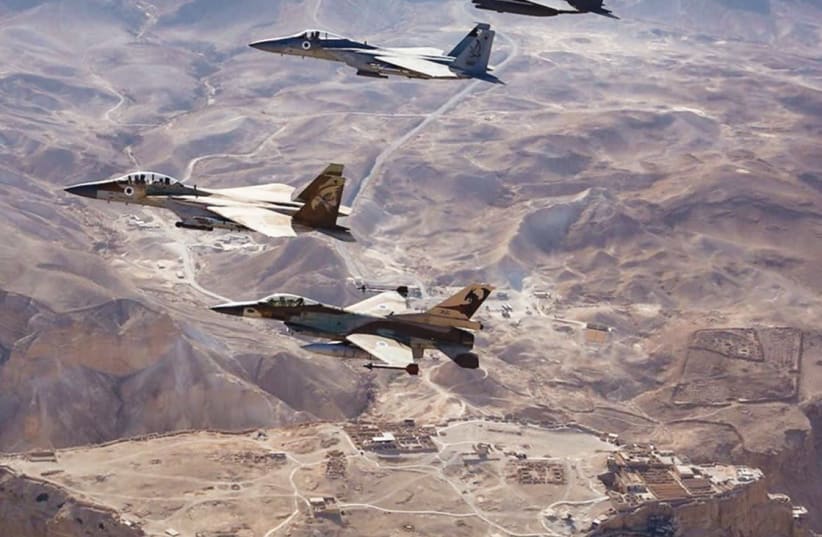“As a result of the irresponsible actions of the Israeli military, 15 Russian service personnel perished,” the TASS news agency quoted Russian Defense Ministry Spokesman Igor Konashenkov as saying. “This absolutely does not correspond to the spirit of Russian-Israeli partnership. We reserve the right to take commensurate measures in response.”Israel’s chargé d’affaires at the embassy in Moscow, Karen Cohen-Gat, was summoned to the Foreign Ministry in Moscow after the incident.Shortly afterward, Prime Minister Benjamin Netanyahu spoke with Putin and expressed “regret” at the death of the 15 Russian servicemen, and said the responsibility for downing the plane rested with Syria.Netanyahu, according to his office, stressed the importance of continued security cooperation between the two countries that “succeeded in preventing many losses on both sides over the last three years.”Netanyahu said Israel was determined to halt the Iranian entrenchment in Syria, and the efforts of Iran – which he stressed calls for Israel’s destruction – to transfer strategic weapons to Hezbollah.In Netanyahu’s phone call with Putin, the premier said Israel would be willing to pass onto Moscow all the details needed for an investigation, and would send Israeli Air Force Commander Maj.-Gen. Amikam Norkin to Moscow for this purpose.The Kremlin issued a statement after the phone call saying that Israel’s actions in Syria were in violation of Syria’s sovereignty.“In this particular case,” the statement said, “Russian-Israeli agreements on preventing dangerous incidents had not been observed either, and that resulted in the Russian aircraft coming under Syrian air defense fire. The Russian president called on the Israeli side to prevent such incidents in the future.”At a press conference with visiting Hungarian Prime Minister Viktor Orban on Tuesday, Putin was asked whether the incident would complicate relations with Israel and – in light of a 2015 incident where Turkish-Russian ties went into a tailspin following Turkey’s downing of a Russian jet – what kind of response to expect from Russia.Putin responded: “As for your comparison with the downing of our plane by a Turkish fighter, this was a different situation. The Turkish fighter deliberately shot down our aircraft. In this case, it is more a chain of tragic circumstances, because an Israeli fighter did not down our aircraft.”The Russian president said, “It goes without saying that we must get to the bottom of this. Our attitude toward this tragedy is set forth in a statement by our Defense Ministry and has been fully coordinated with me. As for reciprocal action, this will be primarily aimed at ensuring additional security for our military and our facilities in the Syrian Arab Republic. These steps will be seen by everyone.”Defense Minister Avigdor Liberman also spoke on Tuesday with his counterpart, Russian Minister of Defense Sergei Shoigu.A statement issued by Manelis said, “Israel holds the Assad regime, whose military shot down the Russian plane, fully responsible for this incident. Israel also holds Iran and the Hezbollah terror organization accountable for this unfortunate incident.”According to a preliminary investigation launched by the Israel Air Force, the Russian plane was not within the area of operation of Israeli jets, and when it was struck, all Israeli jets that took part in the operation had already returned to Israeli territory.“The Syrian anti-aircraft batteries fired indiscriminately and, from what we understand, did not bother to ensure that no Russian planes were in the air,” Manelis said, adding, “The extensive and inaccurate Syrian anti-aircraft missile fire caused the Russian plane to be hit.”Contrary to what the Russians saying, Manelis said the deconfliction mechanism implemented with Russia was in use “like it has been in use in the past.”Israel rarely comments on foreign reports of military activity in Syria but recently publicly admitted to having struck more than 200 targets in Syria over the past year and a half. According to the IDF, the strikes mainly targeted advanced weapons systems and infrastructure belonging to Iran’s Revolutionary Guard Corps and were aimed at preventing Iranian entrenchment in Syria.Preliminary #BDA - the ammunition warehouse striked two day ago in #Latakia, #Syria, is completely destroyed. pic.twitter.com/Wg5MRgiOFR
— imagesatintl (@imagesatint) September 19, 2018
Satellite images show results of Israel’s strike in Syria
15 Russians were killed when Syria fired a missile at an Israeli plane and hit a Russian plane.
